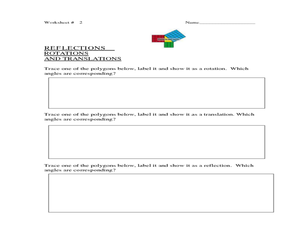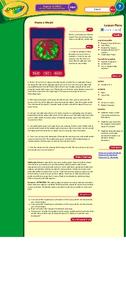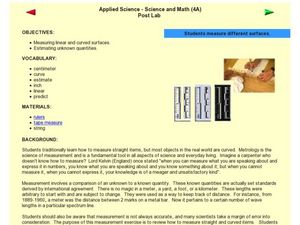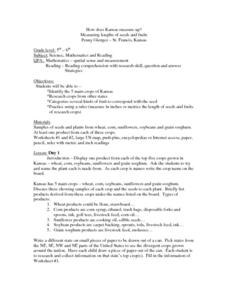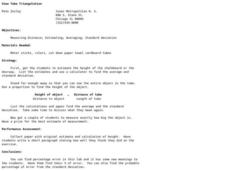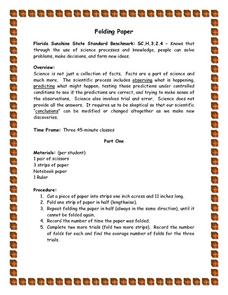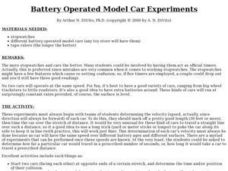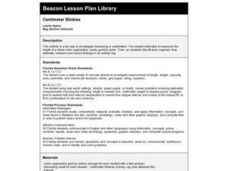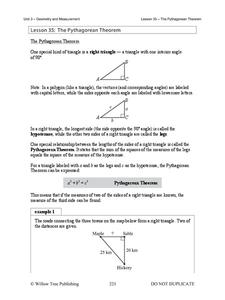Curated OER
Cartography Project
A lesson involving mapping, the use of a compass, writing and following directions, and exploring the first two themes of geography is here for you. Learners create original maps that show the routes they take through their own...
Curated OER
Equivalent Fraction Paper Strips
Young learners compare the relative values of fractions by making physical representations. They fold and label strips of paper that are equal in length to represent "one whole" and the equal parts that fractions represent. Also, they...
Virginia Department of Education
The Law of Conservation of Matter
The Law of Conservation of Matter can be complex for young scientists to fully grasp. Use this experiment to help simplify the process as pupils perform two experiments to determine mass: one that melts a substance and the other that...
Curated OER
Can You Name That Shape?
Learners use materials to build, investigate, and draw two-dimensional shapes (polygons). They combine the shapes they have built and draw from the pile to begin a round-robin activity to name and determine the attributes of a selection...
Curated OER
Point Comparisons
Young geometers investigate two-dimensional figures using coordinate grids. They identify polygons and draw examples of their reflection, rotation, and translation on a coordinate grid. And they complete a worksheet practicing examples...
Student Handouts
What Year Is It?
This page includes a space to write in the date, but what does the date even mean? And where does it come from? Inform your class about the various calendars and how the Western calendar came into widespread use with an informational...
Curated OER
Weave a Wreath
Students follow directions to complete a multi-step process that results in an attractive holiday decoration. In this Christmas art activity lesson, students employ simple measuring and weaving techniques and experiment with the negative...
Curated OER
Measuring Different Surfaces
Fourth graders investigate measurement of linear and curved surfaces. In this math lesson, 4th graders discuss how to measure curved surfaces and work with a partner to measure various curved surfaces.
Curated OER
How Does Kansas Measure Up?
Students identify the five main crops of Kansas and crops that are produced in other states. The categorize the types of fruits and seeds of each plant and measure each to compare the length of each.
Curated OER
Va Va Va Zoooommm
Students, in groups, measure a variety of physical components to several activities. They use both standard and non-standard forms of measurement and then develop conclusions about the use of units in measurement.
Curated OER
Candy Bar Math Fun!
Students practice math. In this measurement lesson plan, students measure their favorite candy bars to the nearest inch. They work independently to compare the different lengths of the candy bars they measure.
Curated OER
View Tube Triangulation
Students investigate a particular object then calculate to find the class average and standard deviation. In this measuring distance lesson students list their calculations on a piece of paper.
Curated OER
Folding Paper
Young scholars use the scientific process and their knowledge to obeserve, predict, and test their predictions under controlled conditions to verify their predictions and then make sense of these predictions. They also graph, write...
Curated OER
Battery Operated Model Car Experiments
Students time battery operated cars over a set track and determine the velocity of each type of car. They use the cars as manipulatives to demonstrate word problems involving velocity.
Alabama Learning Exchange
What Is An Inch?
Students identify the length of an inch. In this measurement lesson, students read Inch by Inch and predict how many inches long various objects are. Students practice measuring the objects by using an inch ruler.
Curated OER
Centimeter Slinkies
Third graders estimate and measure the length of a whole color-segmented, candy gummy worm. Then, as students bite off each segment, they estimate, measure and record findings in an activity log.
Curated OER
"Where Does Pi Come From?"
Fifth graders explore geometry by exploring Pi. In this circle measurement instructional activity, 5th graders identify the relationship between the radius, diameter and circumference of a circle and how Pi is the key to unlocking any...
Curated OER
Are you in Golden Shape
Students solve and verify the solution for unknown measures. In this geometry lesson, students identify the properties of circles. They use the arc, angle and segment relationship to find the missing measures.
Curated OER
Make A Rain Gauge
Students explore mathematics by participating in a nature measurement activity. In this rain lesson, students discuss the appropriate methods used in order to measure rain downpour. Students utilize a plastic bottle, tape, stones...
Curated OER
Structures and Shapes
Pupils make jewelry using different shapes from magazines, tissue paper, cardboard, and other materials. In this making jewelry lesson plan, students complete this hands on activity to discuss how shapes are used.
Curated OER
Don't Burst My Bubble
Middle schoolers practice using measuring techniques by examining bubbles. In this geometry lesson, students utilize mathematic formulas to discover the circumference and diameter of soap bubbles they blow. Middle schoolers...
Curated OER
The Pythagorean Theorem
Seventh graders relate the Pythagorean theorem to the real world. In this algebra lesson, 7th graders identify important properties of the Pythagorean theorem and use it to solve word problems. They create a step by step plan to...
Alabama Learning Exchange
How Old Is That Tree?
Fifth graders study environmental changes by examining the annual rings of a cross-section of a tree trunk. They access websites to complete a worksheet on the parts of a tree. They count the annual rings on a tree slice while observing...
Utah Education Network (UEN)
It's All Just Similar to Me
Middle schoolers explore the concept of similar figures. In this similar figures lesson, pupils calculate scale factors of similar triangles. They find missing sides of triangles, and measure angles using protractors and measure sides of...




